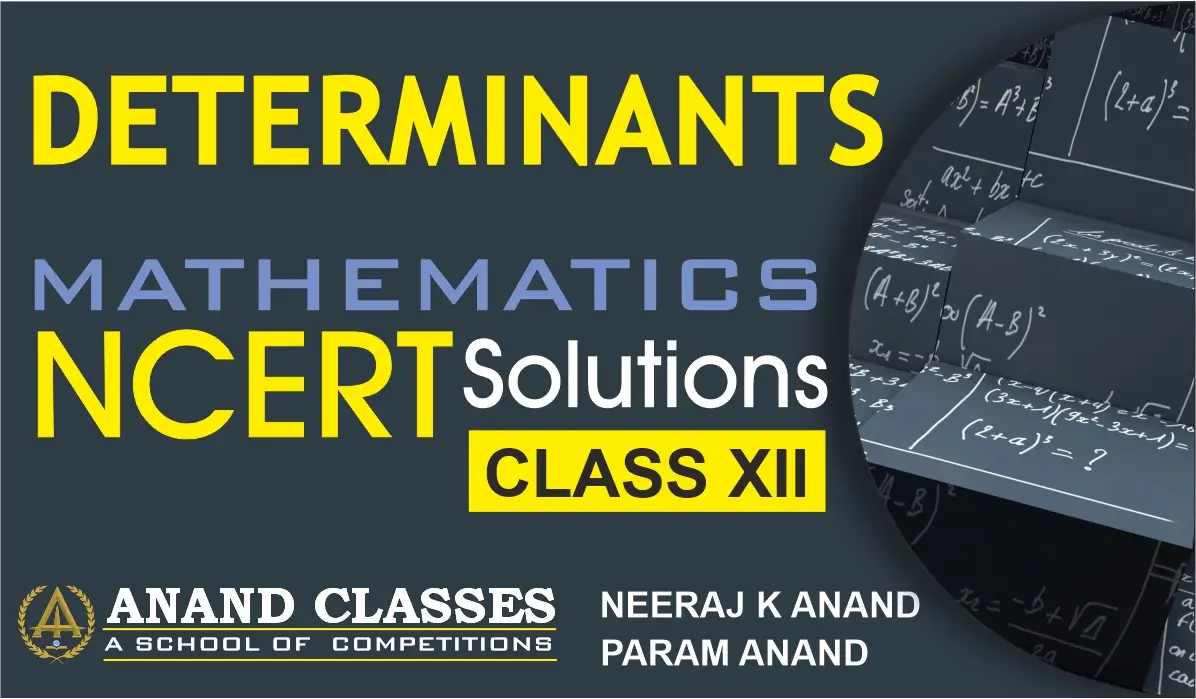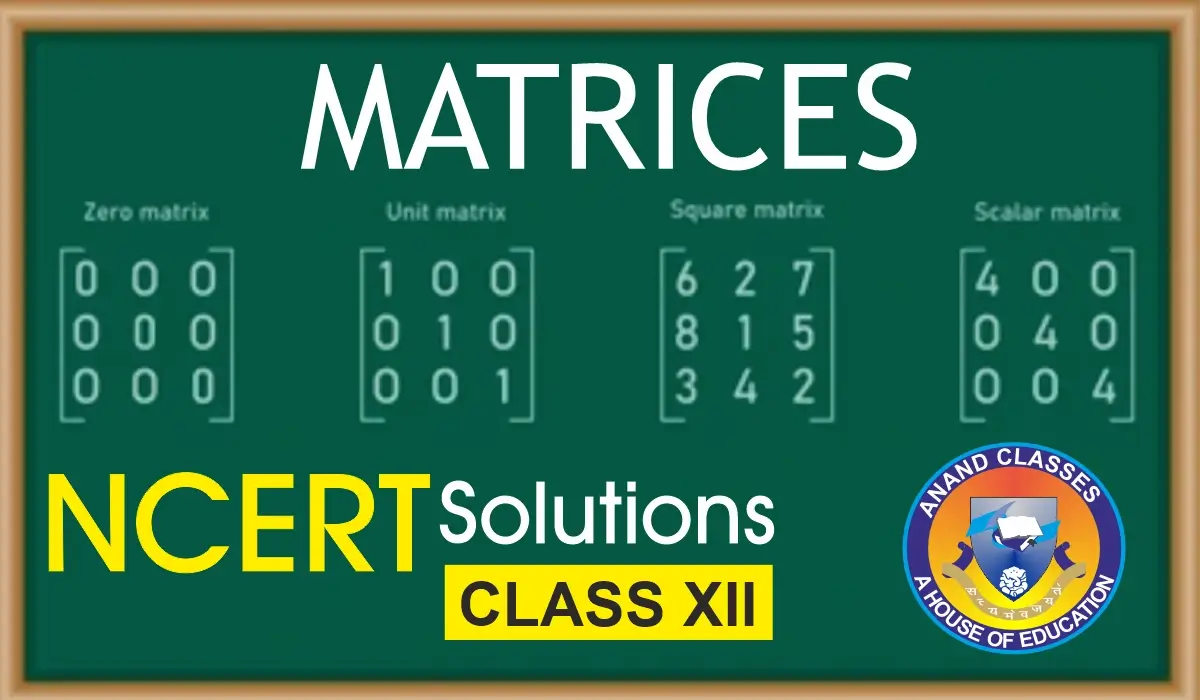Anand Classes provides complete and well-organized NCERT Solutions for the Miscellaneous Exercise of Chapter 7 Integrals for Class 12 Mathematics, helping students improve accuracy and conceptual clarity with detailed step-by-step explanations. These Set-4 notes are aligned with the latest NCERT syllabus and are ideal for revision, practice, and final exam preparation. Click the print button to download study material and notes.
NCERT Question.31 : Evaluate the integral
$$\displaystyle \int_{1}^{4}\Big(|x-1|+|x-2|+|x-3|\Big)\;dx$$
Solution
Let
$$I=\int_{1}^{4}\Big(|x-1|+|x-2|+|x-3|\Big)\;dx.$$
Then
$$I=I_{1}+I_{2}+I_{3}$$
where
$$
I_{1}=\int_{1}^{4}|x-1|\;dx,\qquad
I_{2}=\int_{1}^{4}|x-2|\;dx,\qquad
I_{3}=\int_{1}^{4}|x-3|\;dx.
$$
Computation of $(I_{1})$
For $(1\le x\le 4)$, we have $(x-1\ge 0)$.
Thus
$$
I_{1}=\int_{1}^{4}(x-1)\;dx
=\left[\frac{x^{2}}{2}-x\right]_{1}^{4}
=\left(8-4\right)-\left(\frac12-1\right)
=\frac{9}{2}.
$$
Computation of $(I_{2})$
For $(1\le x\le 2), (x-2\le 0), |x-2| = -(x-2)$
For $(2\le x\le 4), (x-2\ge 0), |x-2| = (x-2)$
Thus
$$
I_{2}=\int_{1}^{2}(2-x)\;dx+\int_{2}^{4}(x-2)\;dx
$$
Compute:
$$
\int_{2}^{4}(x-2)\;dx=\left[\frac{x^{2}}{2}-2x\right]_{2}^{4},
\qquad
\int_{1}^{2}(2-x)\;dx=\left[2x-\frac{x^{2}}{2}\right]_{1}^{2}
$$
Thus
$$
I_{2}=\left(8-8\right)-\left(2-2\right)+\left(4-2\right)-\left(2-\frac12\right)
=\frac52.
$$
Computation of $(I_{3})$
For $(1\le x\le 3), (x-3\le 0), |x-3| = -(x-3)$
For $(3\le x\le 4), (x-3\ge 0), |x-3| = (x-3)$
Thus
$$
I_{3}=\int_{1}^{3}(3-x)\;dx+\int_{3}^{4}(x-3)\;dx
$$
Compute:
$$
\int_{3}^{4}(x-3)\;dx=\left[\frac{x^{2}}{2}-3x\right]_{3}^{4},
\qquad
\int_{1}^{3}(3-x)\;dx=\left[3x-\frac{x^{2}}{2}\right]_{1}^{3}
$$
Thus
$$
I_{3}=\left(8-12\right)-\left(\frac92-9\right)+\left(9-3\right)-\left(3-\frac12\right)
=\frac52.
$$
Final Result
$$
I=I_{1}+I_{2}+I_{3}
=\frac{9}{2}+\frac{5}{2}+\frac{5}{2}
=\boxed{\frac{19}{2}}.
$$
Strengthen your preparation with expertly formatted calculus solutions from Anand Classes — ideal for Class 11–12, JEE aspirants, and CBSE students looking for clear, structured study material.
NCERT Question.32 : Prove the following
$$\displaystyle I=\int_{1}^{3}\frac{dx}{x^{2}(x+1)}=\dfrac{2}{3}+\ln\dfrac{2}{3}$$
Solution
$$\displaystyle I=\int_{1}^{3}\frac{dx}{x^{2}(x+1)}$$
Decompose into partial fractions:
$$
\frac{1}{x^{2}(x+1)}=\frac{A}{x}+\frac{B}{x^{2}}+\frac{C}{x+1}.
$$
Multiplying by $x^{2}(x+1)$ gives
$$
1=Ax(x+1)+B(x+1)+Cx^{2}= (A+C)x^{2}+(A+B)x+B.
$$
Equating coefficients yields
$$
A+C=0,\qquad A+B=0,\qquad B=1.
$$
Hence $B=1, A=-1, C=1$. Therefore
$$
\frac{1}{x^{2}(x+1)}=-\frac{1}{x}+\frac{1}{x^{2}}+\frac{1}{x+1}.
$$
Integrate termwise:
$$
I=\int_{1}^{3}\Big(-\frac{1}{x}+\frac{1}{x^{2}}+\frac{1}{x+1}\Big)\;dx
=\Big[-\ln x-\frac{1}{x}+\ln(x+1)\Big]_{1}^{3}.
$$
Evaluate the limits:
$$
I=\Big(\ln\frac{4}{3}-\frac{1}{3}\Big)-\Big(\ln 2-1\Big)
=\ln\frac{4}{3}-\frac{1}{3}-\ln 2+1
=\ln\frac{2}{3}+\frac{2}{3}.
$$
Final Result
$$\boxed{\;I=\dfrac{2}{3}+\ln\dfrac{2}{3}\;}$$
Download clear, step-by-step integral solutions from Anand Classes — perfect for JEE and CBSE revision, concise partial-fraction methods, and top-quality study material.
NCERT Question.33 : Prove the following
$$\int_{0}^{1} x \;e^{x}\;dx = 1$$
Solution
$$\int_{0}^{1} x \; e^{x}\;dx$$
Using integration by parts:
$$\int u\;dv = uv – \int v\;du.$$
Let
$$u = x,\qquad dv = e^{x}\;dx,$$
so that
$$du = dx,\qquad v = e^{x}.$$
Therefore,
$$\int_{0}^{1} x e^{x}\;dx = \Big[x e^{x}\;\Big]_{0}^{1} – \int_{0}^{1} e^{x}\;dx.$$
Now integrate:
$$\int_{0}^{1} x e^{x}\;dx = \Big[x e^{x}\;\Big]_{0}^{1} – \Big[ e^{x}\;\Big]_{0}^{1}.$$
Applying limits:
$$\Big[x e^{x}\;\Big]_{0}^{1} = e$$
$$\Big[ e^{x}\;\Big]_{0}^{1} = e – 1.$$
Thus,
$$\int_{0}^{1} x e^{x}\;dx = e – (e – 1) = 1.$$
Final Result
$$\boxed{1}$$
For more clear, exam-oriented calculus solutions, explore the expertly prepared notes from Anand Classes — ideal for JEE and CBSE students aiming for strong conceptual mastery.
NCERT Question.34 : Prove the following
$$\int_{-1}^{1} x^{17}\cos^{4}x\;dx=0$$
Solution
Let
$$I=\int_{-1}^{1} x^{17}\cos^{4}x\;dx.$$
Consider the function
$$f(x)=x^{17}\cos^{4}x.$$
Now check its parity:
$$f(-x)=(-x)^{17}\cos^{4}(-x).$$
Since $17$ is odd,
$$(-x)^{17}=-x^{17},$$
and $\cos^{4}(-x)=\cos^{4}x$ (even power of cosine, also cosine function is even).
Thus,
$$f(-x)=-x^{17}\cos^{4}x=-f(x).$$
Hence $f(x)$ is an odd function.
For every odd function,
$$\int_{-a}^{a} f(x)\;dx = 0.$$
Therefore,
$$I=\int_{-1}^{1} x^{17}\cos^{4}x\;dx = 0.$$
Final Result
$$\boxed{0}$$
Strengthen your understanding of definite integrals with the expertly curated notes from Anand Classes — perfect for JEE, CUET, and CBSE preparation.
NCERT Question.35 : Prove the following
$$I=\int_{0}^{\dfrac{\pi}{2}}\sin^{3}x\;dx=\dfrac{2}{3}$$
Solution
$$I=\int_{0}^{\dfrac{\pi}{2}}\sin^{3}x\;dx$$
Use the identity $\sin^{3}x=\sin x\;(1-\cos^{2}x)$. Then
$$
I=\int_{0}^{\frac{\pi}{2}}\sin x\;(1-\cos^{2}x)\;dx
=\int_{0}^{\frac{\pi}{2}}\sin x\;dx-\int_{0}^{\frac{\pi}{2}}\sin x\cos^{2}x\;dx.
$$
Evaluate the first integral:
$$
\int_{0}^{\frac{\pi}{2}}\sin x\;dx=\big[-\cos x\big]_{0}^{\frac{\pi}{2}}=1.
$$
For the second, put $u=\cos x\Rightarrow du=-\sin x\;dx$. When $x=0,\;u=1$ and when $x=\frac{\pi}{2},\;u=0$. Thus
$$
\int_{0}^{\frac{\pi}{2}}\sin x\cos^{2}x\;dx
=-\int_{1}^{0}u^{2}\;du=\int_{0}^{1}u^{2}\;du=\Big[\frac{u^{3}}{3}\Big]_{0}^{1}=\frac{1}{3}.
$$
Hence
$$
I=1-\frac{1}{3}=\frac{2}{3}.
$$
Final Result
$$\boxed{\;I=\dfrac{2}{3}\;}$$
Download more worked integrals and clear step-by-step solutions from Anand Classes—perfect for JEE and CBSE revision and top-quality study material.
NCERT Question.36 : Prove the following
$$I=\int_{0}^{\dfrac{\pi}{4}}2\tan^{3}x\;dx=1-\ln2$$
Solution
$$I=\int_{0}^{\dfrac{\pi}{4}}2\tan^{3}x\;dx$$
Write the integrand as
$$2\tan^{3}x=2\tan^{2}x\;\tan x=2(\sec^{2}x-1)\tan x.$$
Hence
$$I=2\int_{0}^{\dfrac{\pi}{4}}(\sec^{2}x-1)\tan x\;dx
=2\int_{0}^{\dfrac{\pi}{4}}\sec^{2}x\;\tan x\;dx-2\int_{0}^{\dfrac{\pi}{4}}\tan x\;dx.$$
For the first integral use $u=\tan x\Rightarrow du=\sec^{2}x\;dx$, so
$$\int\sec^{2}x\;\tan x\;dx=\int u\;du=\frac{u^{2}}{2}=\frac{\tan^{2}x}{2}.$$
For the second,
$$\int\tan x\;dx=-\ln\big|\cos x\big|.$$
Therefore
$$I=\Big[\tan^{2}x+2\ln\big|\cos x\big|\Big]_{0}^{\frac{\pi}{4}}.$$
Evaluate the limits:
$$\tan^{2}\frac{\pi}{4}=1,\qquad \tan^{2}0=0,$$
$$\ln\big|\cos\frac{\pi}{4}\big|=\ln\frac{1}{\sqrt{2}}=-\frac{1}{2}\ln 2,\qquad \ln|\cos 0|=0.$$
Thus
$$I=\Big(1+2\big(-\frac{1}{2}\ln 2\big)\Big)-\big(0+0\big)=1-\ln 2.$$
Final Result
$$\boxed{\;I=1-\ln 2\;}$$
Download concise, exam-focused integration notes from Anand Classes — perfect for JEE and CBSE practice with clear step-by-step solutions and reliable study material.
NCERT Question.37 : Prove the following
$$\int_{0}^{1}\sin^{-1}x\;dx=\frac{\pi}{2}-1$$
Solution
Let
$$I=\int_{0}^{1}\sin^{-1}x\;dx.$$
Write it as
$$I=\int_{0}^{1}\sin^{-1}x\cdot 1\;dx.$$
Use integration by parts:
- First function: $\sin^{-1}x$
- Second function: $1$
Then
$$I=\Big[x\sin^{-1}x\Big]_{0}^{1}-\int_{0}^{1}x\;\frac{1}{\sqrt{1-x^{2}}}\;dx.$$
Rewrite the integral:
$$I=\Big[x\sin^{-1}x\Big]_{0}^{1}+\frac12\int_{0}^{1}\frac{-2x}{\sqrt{1-x^{2}}}\;dx.$$
Substitute
$$t=1-x^{2},\qquad dt=-2x\;dx.$$
When $x=0,\; t=1$
When $x=1,\; t=0$
Thus
$$I=\Big[x\sin^{-1}x\Big]_{0}^{1}+\frac12\int_{1}^{0}\frac{1}{\sqrt{t}}\;dt.$$
Evaluate:
$$\int t^{-1/2}\;dt=2\sqrt{t}.$$
Hence
$$I=\Big[x\sin^{-1}x\Big]_{0}^{1}+\frac12\Big[2\sqrt{t}\Big]_{1}^{0}.$$
Now compute limits:
- $\Big[x\sin^{-1}x\Big]_{0}^{1}=1\cdot\frac{\pi}{2}-0= \frac{\pi}{2}$
- $\Big[2\sqrt{t}\Big]_{1}^{0}=0-2=-2$
Thus
$$I=\frac{\pi}{2}+\frac12(-2)=\frac{\pi}{2}-1.$$
Final Result
$$\boxed{\;\frac{\pi}{2}-1\;}$$
Improve your calculus mastery with detailed notes and solved examples from Anand Classes — highly effective for JEE, NEET, and CBSE preparation with step-by-step clarity.
NCERT Question.38 : Choose the correct answers from the following by evaluate integral
$$\int \frac{dx}{e^{x}+e^{-x}}$$
(A) $\tan^{-1}(e^{x})+C$
(B) $\tan^{-1}(e^{-x})+C$
(C) $\log(e^{x}-e^{-x})+C$
(D) $\log(e^{x}+e^{-x})+C$
Solution
$$\int \frac{dx}{e^{x}+e^{-x}}$$
Rewrite the integrand:
$$\frac{1}{e^{x}+e^{-x}}$$
$$\frac{e^{x}}{e^{2x}+1}$$
Put
$$t=e^{x}\Rightarrow dt=e^{x}dx.$$
Thus,
$$
I=\int \frac{e^{x}\;dx}{e^{2x}+1}
=\int \frac{dt}{t^{2}+1}
=\tan^{-1}(t)+C
=\tan^{-1}(e^{x})+C.
$$
Final Result
$$\boxed{\tan^{-1}(e^{x})+C}$$
Correct Option: (A)
Explore more high-quality integration solutions and study material from Anand Classes — ideal for building strong exam-ready concepts.
NCERT Question.39 : Choose the correct answers from the following by evaluate integral
$$\displaystyle I=\int \frac{\cos 2x}{(\sin x+\cos x)^{2}}\;dx$$
Options
(A) $(\sin x+\cos x)^{-1}+C$
(B) $\ln\big|\sin x+\cos x\big|+C$
(C) $\ln\big|\sin x-\cos x\big|+C$
(D) $(\sin x+\cos x)^{2}+C$
Solution
$$\displaystyle I=\int \frac{\cos 2x}{(\sin x+\cos x)^{2}}\;dx$$
Use the identity $ \cos 2x=\cos^{2}x-\sin^{2}x=(\cos x+\sin x)(\cos x-\sin x)$. Hence
$$
\frac{\cos 2x}{(\sin x+\cos x)^{2}}
=\frac{(\cos x+\sin x)(\cos x-\sin x)}{(\sin x+\cos x)^{2}}
=\frac{\cos x-\sin x}{\sin x+\cos x}.
$$
Put $$t=\sin x+\cos x\quad\Rightarrow\quad dt=(\cos x-\sin x);dx.$$
Therefore
$$
I=\int \frac{dt}{t}=\ln\big|t\big|+C=\ln\big|\sin x+\cos x\big|+C.
$$
Final Result
$$\boxed{\;I=\ln\big|\sin x+\cos x\big|+C\;}$$
Correct option: (B)
Download more neatly worked integration solutions from Anand Classes — ideal for JEE and CBSE practice with clear, exam-focused steps and reliable study material.
NCERT Question.40 : Given $\displaystyle\int_{a}^{b} f(x),dx=\int_{a}^{b} f(a+b-x)\;dx\;$ and $f(a+b-x)=f(x)$. Find
$$\displaystyle \int_{a}^{b} x\;f(x)\;dx$$
Options
(A) $\dfrac{a+b}{2}\displaystyle\int_{a}^{b} f(b-x)\;dx\\[0.5em]$
(B) $\dfrac{a+b}{2}\displaystyle\int_{a}^{b} f(b+x)\;dx\\[0.5em]$
(C) $\dfrac{b-a}{2}\displaystyle\int_{a}^{b} f(x)\;dx\\[0.5em]$
(D) $\dfrac{a+b}{2}\displaystyle\int_{a}^{b} f(x)\;dx\\[0.5em]$
Solution
Let
$$I=\int_{a}^{b} x\;f(x)\;dx.$$
Using the symmetry $f(a+b-x)=f(x)$ and the change of variable $x\to a+b-x$, we have
$$I=\int_{a}^{b} (a+b-x)\;f(a+b-x)\;dx$$
$$I=\int_{a}^{b} (a+b-x)\;f(x)\;dx$$
Add the two expressions for $I$:
$$
2I=\int_{a}^{b}\big(x+(a+b-x)\big)f(x)\;dx
=(a+b)\int_{a}^{b} f(x)\;dx.
$$
Therefore
$$I=\frac{a+b}{2}\int_{a}^{b} f(x)\;dx.$$
Final Result
$$\boxed{\displaystyle \int_{a}^{b} x\;f(x)\;dx=\frac{a+b}{2}\int_{a}^{b} f(x)\;dx\quad\text{(Option D)}}$$
Download concise well-formatted integration notes by Anand Classes — perfect for quick revision competitive-exam practice and clear step-by-step solutions.


